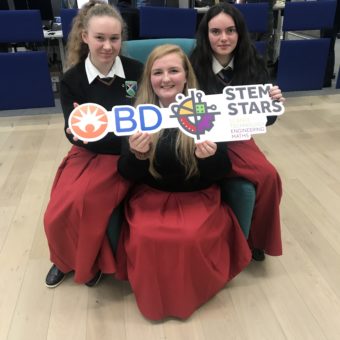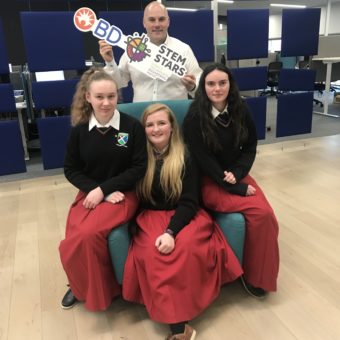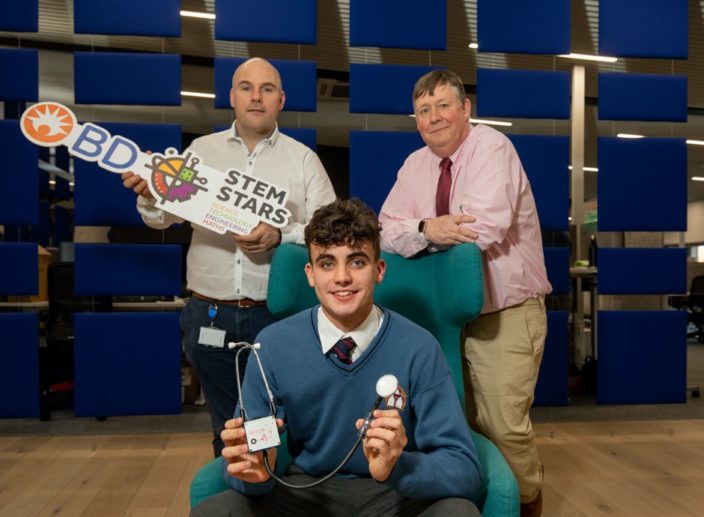Thomond Community College was crowned winner of the BD STEM Stars Competition and awarded €10,000 in STEM funding at a presentation in BD’s Research Centre Ireland (RCI) on Friday, 6 December 2019. The global medical technology company, based in Limerick’s National Technology Park in Castletroy, awarded over €24,000 in STEM funding prizes to seven secondary schools across Limerick and Clare as part of the BD STEM Stars Competition.
The title of our project was: “Stress and Anxiety in Teenagers and how blue light colour therapy can help.” We went about investigating why teenagers in our school get stressed out, with school life and social media being the main sources of stress.
We researched colour therapy and how a particular wavelength of blue light can actually have the effect of reducing stress levels and calming individuals. In Biology, we learnt about the effect stress has on the body. We visited Watch House Cross to see their sensory room and came back & tried to recreate a similar feeling in our Meditation Room. In coding class we went about creating code for Zip Halos with the Microbit to produce a sequence of blue lights that were aimed to calm and induce a feeling of relaxation. We wanted every student to be able to experience this blue light in a product so we tried 3D printing phone cover cases but found the best solution to be blue film paper over the camera lens.
To test our product, we then gave a surprise Maths test to a first year class & tested their blood pressure before, after and then after exposure to the blue light therapy in the Meditation room (having a control group who remained under standard lighting conditions). The results proved that the group exposed to the blue light colour therapy had their stress levels reduce quicker. This project has encompassed the best that STEM skills can bring to a research problem and helped produce a viable solution to teenage stress & anxiety.
The competition invited students to identify a key health problem that affects their community and demonstrate how they could solve or improve this problem through the STEM subjects. Thomond Community College were awarded the overall prize for their project which explored the use of blue light to manage stress and anxiety. Runners up, and recipients of €5,000 in STEM funding each, were students from Gaelcholáiste Luimnigh, who designed and created an automated medication dispensing unit, and Desmond College in Newcastle West, who designed and created an enhanced digital stethoscope.
“BD STEM Stars was an excellent competition allowing students the opportunity to highlight a health issue of importance to them, Mental Health in our society. Students used their creative skills & knowledge across a range of STEM subject areas including Biology, Physics, Computer Coding, Graphics and Maths. They investigated and developed a very interesting solution through Colour Light Therapy. The students were an absolute pleasure to work with and have bright futures ahead of them.- Bernie O’Driscoll BD STEM Stars Team Leader
Winning the BD STEM Stars competition was a great achievement for all of us. We worked hard on the project and the presentation. It was a really interesting project to work on as stress and anxiety really is a big issue for teenagers these days. It was great to see how STEM subjects can be used in the real world to find a solution that can help to reduce anxiety. – Alex Kelly, TY team member of TCC STEM Stars Group
We are delighted at the success of this very hard-working group of students. STEM Education is very strong in Thomond Community College with a team of highly dedicated STEM teachers, many of whom have industry experience, forging ahead with innovative teaching and learning methodologies. We would like to thank BD Medical for their very generous prize of €10000 which will further enhance STEM education provision in Thomond Community College. – Norma O’Brien, Principal

Three students from Gaelcholáiste Luimnigh, Sarah Moloney, Kathy O’Farrell and Mary O’Callaghan created an Automated Medicine Management and Dispensing Unit.
According to the students, there can be countless problems with medication use amongst people, and especially older people. Whether it’s forgetting to take medication at the right time or taking the wrong medication, consequences can sometimes be life-threatening or life altering. The students designed and created a pill dispenser to eliminate these problems. They decided to make an automated medicine management and dispensing unit or pill dispenser. The device ensures that the patient’s medicine is delivered at regular intervals, eliminating the risks of overmedicating and alerting them when medication is due. It also alerts the carer via text message when medication has not been administered.
Some features of technology the students included are GSM module (this allows the device to send text messages), RTC module (this keeps time stamps of when the patient takes their medication), LCD (this displays the information), RFID module (this allows the patient to scan and receive their medication).
When the patient uses the patient access tag, the unit determines when the last medication was delivered and will only dispense medicine when the predetermined time between medicine has lapsed, this reduces the risk of over medicating and mixing morning, afternoon and evening medicine. If the patient tries to take medication before the due time it will be displayed on the LCD the countdown time before next medication. If the patient fails to take their medicine before a predetermined time, then the carer is automatically notified via text message from the unit.
 The Design and Development of an Enhanced Digital Stethoscope for Remote Auscultation
The Design and Development of an Enhanced Digital Stethoscope for Remote Auscultation
Medical professionals rely on auscultation to routinely examine the status of the circulatory, respiratory, and/or gastrointestinal systems. Auscultation is defined as listening to internal sounds of the body and represents an essential component in the delivery of health care services. The procedure is accomplished through the use of a stethoscope, a medical device specifically designed to enable physicians, nurses, and other medical professionals to detect and analyse heart, lung, and/or bowel sounds for purposes of differential diagnosis. The art of auscultation not only requires a level of clinical skill, but also assumes the presence of optimal listening conditions that would enable the practitioner to hear what needs to be heard.
Health is a fundamental aspect of quality of life, not only because being free from illness or injury directly affects our capacity to enjoy life, but also because health indirectly affects our capacity to produce and consume other valuable goods and services. Whether you’re from Limerick or Liberia, Ardagh or Africa, you will require medical intervention at some stage of your life. If you are in the hands of a medical practitioner chances are they will use a stethoscope as part of the diagnosis process. My project involves enhancing the stethoscope by the inclusion of some electronics which will allow for the capture of heart, lung and other bodily auscultations, the amplification, storage and transmitting of these.
 Oisin O Sullivan is 5th Year Student in Desmond College, Newcastle West, Co. Limerick.
Oisin O Sullivan is 5th Year Student in Desmond College, Newcastle West, Co. Limerick.
Donncha Ó Treasaigh, Director of Schools at Limerick and Clare Education and Training Board, congratulated all schools, students and staff for achieving the top and runner-up prizes. He said
Teachers in our Schools are renowned for their achievements in Science related subjects and the accomplishments of students and teachers in three of our schools to secure the top prizes is evidence of the excellent teaching and learning in STEM at our schools.


Share this on...